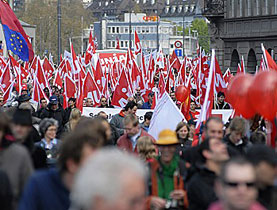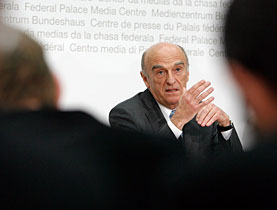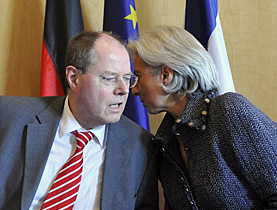Economic crisis spurs no “wave of solidarity”

Layoffs, anger over bonuses and banking secrecy: Switzerland is experiencing its biggest economic crisis in decades but the left has been slow to profit from it.
As unions mark Labour Day on May 1, a politician and a political scientist say people are not yet aware of the possible effects the crisis will have on them and their jobs.
The political left and trade unions are “very present in the media and actively bringing proposals”, political scientist Hans Hirter told swissinfo. “But I don’t believe that this will help them increase their share of the vote or mobilise the electorate.”
People are very angry and frustrated, according to the head of the centre-left Social Democrats, Christian Levrat.
“However it has not been possible to turn this into a positive. The crisis is manifesting itself much more in spur of the moment actions on the edge of legality,” Levrat added, alluding to the managers abducted in France.
“What is certain is that there is no Europe-wide social movement which can focus on future projects,” Levrat said.
“The other part of the explanation is the attitude of the centre-right and government who say we’re all in the same boat. I believe that some are still rowing while others have made themselves comfortable up in the berths.”
The Social Democratic president says the real victims of the crisis won’t be the top bankers but regular employees. “They’ll pay the price in the end through dwindling purchasing power, higher unemployment and cuts in public spending. We must succeed in communicating that more clearly.”
The fact that it is Switzerland’s largest bank, UBS, that has announced the biggest round of layoffs has not helped the left either, Hirter believes.
“It is not easy to feel solidarity with top bank employees who travel a lot,” he said. “It would be a different matter if we were talking about workers in the machine industry or assembly line.”
Outside pressure
Ending the distinction between tax fraud and tax evasion is an old demand of the left. The fact that this is now happening is not down to the efforts of the left.
“It’s happened the way we requested,” Levrat said. “The difficulty I see in it is that many measures were imposed on us from abroad and did not come about as a result of internal democratic processes.”
That has put the Social Democrats in an “ambiguous situation”, Hirter says. They can’t praise the relaxing of banking secrecy laws too aggressively without running the risk of “being stuck in the wrong corner” and being perceived as “betraying the country”.
“The strongest critic of tax evasion, German Finance Minister Peer Steinbrück, is a Social Democrat,” he noted.
No ultimate symbol
Levrat explained he had written his German colleague a letter and asked him to deal with Switzerland “according to normal, diplomatic practice”.
“The problem isn’t his attitude but the pitch of his message. The majority of the Swiss population is convinced that we do should not welcome in tax fugitives. But they aren’t ready to put their private data at the disposal of just anybody.”
Moreover, he believes that “civil rhetoric” about banking secrecy as “the ultimate symbol of patriotism” hasn’t really hit home with the people.
“People see through the game. Above all this is about the interests of the very rich, who at the expense of ordinary citizens, aren’t ready to pay their taxes,” he said.
Civil opposition
Hirter says the left would do well not to demand more taxes from the rich, something which is much more difficult than in Germany.
“Self responsibility and self-determination are much bigger issues for us,” he said. Instead, the left should champion better measures to fight tax evasion.
“We do that in a systematic way,” Levrat said. “Shortly after my appointment I asked that the number of tax inspectors assigned to large cases be doubled.”
“But we are still coming up against opposition from Finance Minister Hans-Rudolf Merz and the centre-right parliamentary majority who are do everything to protect the biggest tax frauds,” he concluded.
“We are damaging the country’s reputation massively when we protect foreign as well as domestic tax cheats.”
swissinfo, based on an article in German by Andreas Keiser
May 1 is the only non-religious holiday celebrated worldwide.
The date commemorates the bloody Haymarket Massacre in Chicago in 1886 when police fired on demonstrators calling for an eight-hour workday.
In 1889 the Second International, a workers congress, declared May 1 as International Workers Day.
May Day was celebrated in 34 places around Switzerland the following year in 1890. The trade union federation then had 5,000 members.
Switzerland’s Social Democratic Party had been founded nine months earlier.
Against the background of the worldwide economic crisis, May 1, May Day, carries particular meaning, the president of the Swiss Trade Union Federation, Paul Rechsteiner, says.
The number of participants at May 1 festivities has been on the upswing since the 1990s.
Andreas Rieger, co-president of the Unia trade union, believes more people than normal will take part in celebrations this year because of the crisis and the scams that triggered it.
The rallies are the events that bring out the most people with social and political concerns.
The trade unions have until now earned little capital from the poor economic situation, since membership numbers declined in 2008.

In compliance with the JTI standards
More: SWI swissinfo.ch certified by the Journalism Trust Initiative





You can find an overview of ongoing debates with our journalists here. Please join us!
If you want to start a conversation about a topic raised in this article or want to report factual errors, email us at english@swissinfo.ch.